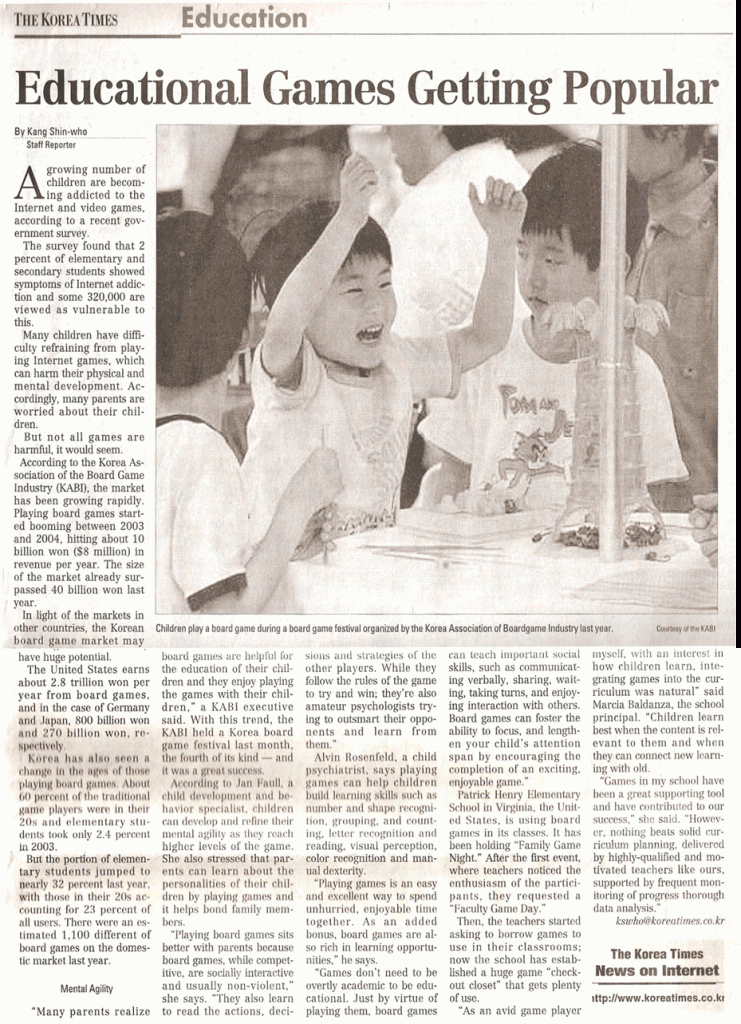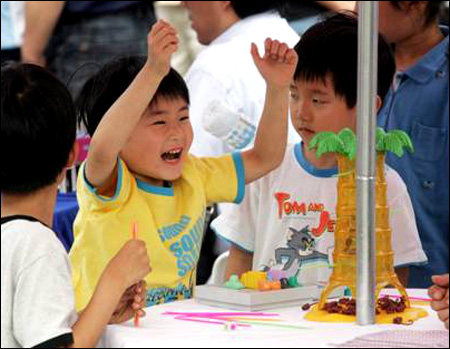[영자지] 코리아타임스 기획 기사 보도

“Educational Games Getting Popular” 라는 제목으로 2009년 7월 23일 보도되었습니다

Educational Games Getting Popular
Children play a board game during a board game festival organized by the Korea Association of Boardgame Industry last year. / Courtesy of the KABI
By Kang Shin-who
Staff Reporter
A growing number of children are becoming addicted to the Internet and video games, according to a recent government survey.
The survey found that 2 percent of elementary and secondary students showed symptoms of Internet addiction and some 320,000 are viewed as vulnerable to this.
Many children have difficulty refraining from playing Internet games, which can harm their physical and mental development. Accordingly, many parents are worried about their children.
But not all games are harmful, it would seem.
According to the Korea Association of the Board Game Industry (KABI), the market has been growing rapidly. Playing board games started booming between 2003 and 2004, hitting about 10 billion won ($8 million) in revenue per year. The size of the market already surpassed 40 billion won last year.
In light of the markets in other countries, the Korean board game market may have huge potential. The United States earns about 2.8 trillion won per year from board games, and in the case of Germany and Japan, 800 billion won and 270 billion won, respectively.
Korea has also seen a change in the ages of those playing board games. About 60 percent of the traditional game players were in their 20s and elementary students took only 2.4 percent in 2003. But the portion of elementary students jumped to nearly 32 percent last year, with those in their 20s accounting for 23 percent of all users. There were an estimated 1,100 different of board games on the domestic market last year.
Mental Agility
“Many parents realize board games are helpful for the education of their children and they enjoy playing the games with their children,” a KABI executive said. With this trend, the KABI held a Korea board game festival last month, the fourth of its kind ― and it was a great success.
According to Jan Faull, a child development and behavior specialist, children can develop and refine their mental agility as they reach higher levels of the game. She also stressed that parents can learn about the personalities of their children by playing games and it helps bond family members.
“Playing board games sits better with parents because board games, while competitive, are socially interactive and usually non-violent,” she says. “They also learn to read the actions, decisions and strategies of the other players. While they follow the rules of the game to try and win; they’re also amateur psychologists trying to outsmart their opponents and learn from them.”
Alvin Rosenfeld, a child psychiatrist, says playing games can help children build learning skills such as number and shape recognition, grouping, and counting, letter recognition and reading, visual perception, color recognition and manual dexterity.
“Playing games is an easy and excellent way to spend unhurried, enjoyable time together. As an added bonus, board games are also rich in learning opportunities,” he says.
“Games don’t need to be overtly academic to be educational. Just by virtue of playing them, board games can teach important social skills, such as communicating verbally, sharing, waiting, taking turns, and enjoying interaction with others. Board games can foster the ability to focus, and lengthen your child’s attention span by encouraging the completion of an exciting, enjoyable game.”
Patrick Henry Elementary School in Virginia, the United States, is using board games in its classes. It has been holding “Family Game Night.” After the first event, where teachers noticed the enthusiasm of the participants, they requested a “Faculty Game Day.” Then, the teachers started asking to borrow games to use in their classrooms; now the school has established a huge game “check-out closet” that gets plenty of use.
“As an avid game player myself, with an interest in how children learn, integrating games into the curriculum was natural” said Marcia Baldanza, the school principal. “Children learn best when the content is relevant to them and when they can connect new learning with old.
“Games in my school have been a great supporting tool and have contributed to our success,” she said. “However, nothing beats solid curriculum planning, delivered by highly-qualified and motivated teachers like ours, supported by frequent monitoring of progress thorough data analysis.”
kswho@koreatimes.co.kr





